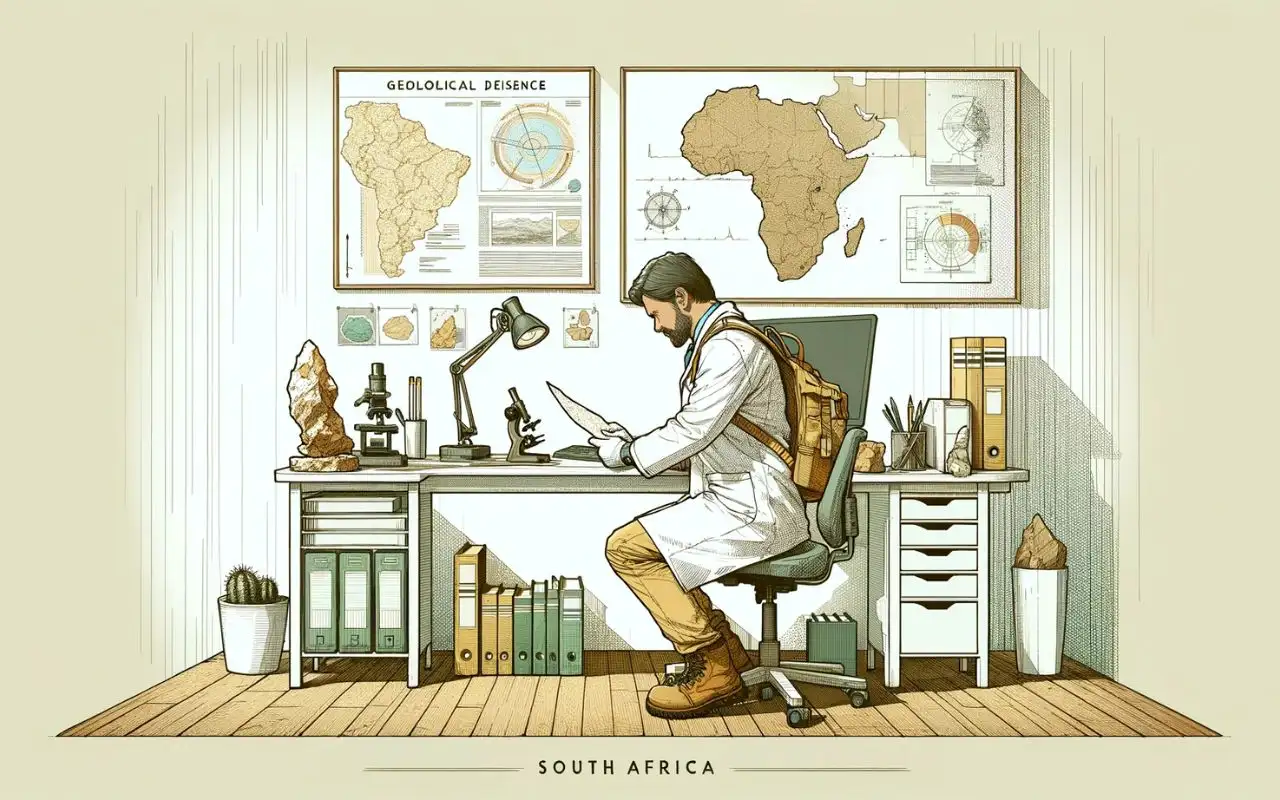A geologist is a scientist who studies the Earth’s physical structure, composition, and processes.
They investigate the planet’s geological history, including the formation of rocks, minerals, and the evolution of landscapes.
Geologists examine rock formations, fossils, and sediments to understand Earth’s past and predict future changes.
They play a crucial role in various fields, such as environmental science, natural resource management, and hazard assessment.
Geologists analyze data from earthquakes, volcanoes, and landslides to mitigate potential risks.
How Much Does A Geologist Earn in South Africa
Geologists in South Africa earn an average monthly salary of R48,000, making it a lucrative profession.
Geologists often receive annual bonuses ranging from R3,000 to R155,000, with 60% receiving bonuses in 2021, typically 3% to 7% of their annual salary.
Income disparities are influenced by employer policies, gender, and education level.
A Bachelor’s degree holder earns around R32,000 monthly, while those with a master’s degree earn R51,100.00, and Ph.D. holders make R85,700.00.
Factors Affecting Geologist Salary in South Africa
Education and Specialization
A geologist’s starting salary heavily depends on their qualifications. Holding a Master’s or PhD degree, especially in specialized fields like geochemistry or geophysics, can significantly increase earning potential.
Experience
Like most professions, experience commands a premium. Geologists with extensive experience, particularly in specific geological settings or projects, are highly sought-after and can negotiate higher salaries.
Employer and Industry
Salaries vary considerably across employers and industries. The mining sector generally offers the highest compensation, followed by government, consulting firms, and academia. State-owned mining companies or large multinational corporations typically pay more than smaller exploration companies.
Location
Geologists working in remote or hazardous locations, like deep mines or offshore rigs, often receive additional allowances or higher base salaries to compensate for the risks and challenging conditions.
Company Performance
The financial health of the employing company significantly impacts salaries. Profitable companies can offer more competitive salaries and bonuses compared to struggling ones.
Negotiation Skills
Effective negotiation skills are crucial for securing a desired salary. Understanding market rates, presenting your qualifications confidently, and highlighting your value to the company can significantly impact your offer.
Professional Affiliations
Belonging to professional bodies like the Geological Society of South Africa (GSSA) demonstrates commitment to the profession and can enhance your credibility, potentially improving your earning potential.
Entrepreneurial Ventures
Geologists with an entrepreneurial spirit can set up their own consulting firms, offering greater control over income but also requiring business acumen and marketing skills.
Supply and Demand
The balance between available geologists and job openings in specific regions or specialities can influence salaries. A shortage of qualified professionals in a particular field can drive salaries upwards.
Non-monetary Benefits
While salary is crucial, consider the overall compensation package. Some employers offer attractive benefits like medical insurance, housing allowances, or flexible work arrangements, which can enhance the overall value of the position.
Education and Qualifications of A Geologist in South Africa
To become a geologist in South Africa, a specific set of educational qualifications and certifications are required:
Bachelor’s Degree in Geology
The foundation of a geologist’s career is a Bachelor’s degree in Geology or Earth Sciences. This program provides a comprehensive understanding of Earth’s composition, structure, and history, covering topics like mineralogy, petrology, palaeontology, and structural geology.
Honours Degree
While a BSc suffices for some entry-level positions, an Honours degree in Geology demonstrates deeper specialization and research capability. It involves advanced coursework and a research project in a specific area of geology, potentially leading to higher starting salaries and opening doors to more specialized roles.
Professional Registration
Registration with the South African Council for Natural Scientific Professions (SACNASP) is crucial for practising geology professionally. This involves meeting specific academic and experience requirements, passing exams, and adhering to ethical codes. Registration enhances trust and credibility, potentially increasing earning potential.
Postgraduate Degrees
Pursuing Master’s or PhD degrees in Geology allows for deep specialization in areas like geophysics, geochemistry, hydrogeology, or economic geology. This advanced knowledge is valuable for research, consultancy, and leadership positions within the geological field, attracting higher salaries and career advancement opportunities.
Short Courses and Specialized Certifications
Continuous professional development through short courses, workshops, and specialized certifications demonstrates dedication to staying current with advancements in the field. These qualifications can enhance specific skills relevant to desired career paths, increasing competitiveness and potentially boosting earning potential.
Fieldwork Experience
Practical experience gained through fieldwork placements, internships, or research projects is highly valued by employers. These opportunities allow geologists to apply theoretical knowledge in real-world settings, develop essential field skills, and demonstrate competence, potentially making them more attractive candidates for job openings.
Data Analysis and GIS Skills
Proficiency in data analysis tools and software like ArcGIS is increasingly important for modern geologists. This skillset allows for effective interpretation of geological data, creating maps and models, and communicating complex findings, making individuals more versatile and valuable to employers.
Communication and Interpersonal Skills
Strong communication and interpersonal skills are essential for geologists working in teams, interacting with clients, and presenting technical information clearly to diverse audiences. Effective communication fosters collaboration, builds trust, and can lead to better career opportunities and potential salary increases.
Business and Project Management Skills
Geologists venturing into consulting or leadership roles benefit from business and project management skills. This knowledge equips them to manage projects effectively, understand financial aspects, and navigate business relationships, making them more well-rounded professionals and potentially increasing their earning potential.
Foreign Language Skills
For geologists working internationally or with diverse teams, fluency in additional languages like French, Portuguese, or local African languages can be a valuable asset. It facilitates communication, fosters cultural understanding, and opens doors to career opportunities in broader geographic regions, potentially leading to higher salaries and career advancement.
These qualifications ensure that geologists in South Africa are well-equipped with the necessary knowledge, skills, and ethical standards to effectively study the Earth, its materials, and processes, and responsibly manage its natural resources.

